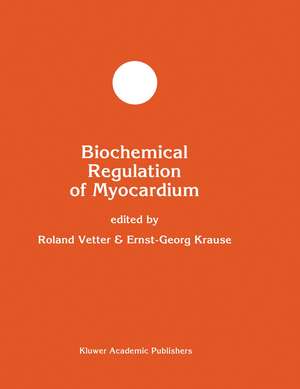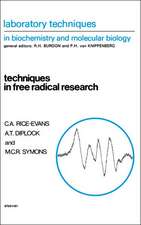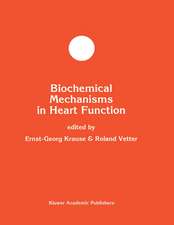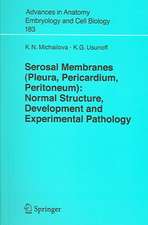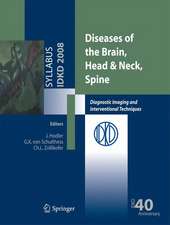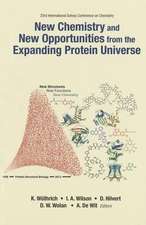Biochemical Regulation of Myocardium: Developments in Molecular and Cellular Biochemistry, cartea 19
Editat de Roland Vetter, Ernst-Georg Krauseen Limba Engleză Hardback – 31 dec 1996
Din seria Developments in Molecular and Cellular Biochemistry
- 5%
 Preț: 389.20 lei
Preț: 389.20 lei - 24%
 Preț: 1056.97 lei
Preț: 1056.97 lei - 18%
 Preț: 1223.70 lei
Preț: 1223.70 lei - 24%
 Preț: 1060.04 lei
Preț: 1060.04 lei -
 Preț: 404.29 lei
Preț: 404.29 lei - 5%
 Preț: 371.30 lei
Preț: 371.30 lei - 18%
 Preț: 1555.51 lei
Preț: 1555.51 lei - 5%
 Preț: 734.57 lei
Preț: 734.57 lei - 24%
 Preț: 1568.12 lei
Preț: 1568.12 lei - 24%
 Preț: 1580.08 lei
Preț: 1580.08 lei - 5%
 Preț: 365.61 lei
Preț: 365.61 lei - 24%
 Preț: 1564.06 lei
Preț: 1564.06 lei - 24%
 Preț: 1077.72 lei
Preț: 1077.72 lei - 15%
 Preț: 582.59 lei
Preț: 582.59 lei - 24%
 Preț: 1583.80 lei
Preț: 1583.80 lei - 5%
 Preț: 671.23 lei
Preț: 671.23 lei - 18%
 Preț: 1222.62 lei
Preț: 1222.62 lei - 24%
 Preț: 801.38 lei
Preț: 801.38 lei - 24%
 Preț: 1098.57 lei
Preț: 1098.57 lei - 18%
 Preț: 940.09 lei
Preț: 940.09 lei - 24%
 Preț: 1060.10 lei
Preț: 1060.10 lei - 5%
 Preț: 1003.85 lei
Preț: 1003.85 lei - 18%
 Preț: 935.67 lei
Preț: 935.67 lei - 5%
 Preț: 1418.48 lei
Preț: 1418.48 lei - 24%
 Preț: 795.19 lei
Preț: 795.19 lei - 18%
 Preț: 947.18 lei
Preț: 947.18 lei - 15%
 Preț: 643.00 lei
Preț: 643.00 lei - 24%
 Preț: 808.09 lei
Preț: 808.09 lei - 18%
 Preț: 951.29 lei
Preț: 951.29 lei
Preț: 1584.02 lei
Preț vechi: 2084.24 lei
-24% Nou
Puncte Express: 2376
Preț estimativ în valută:
303.09€ • 316.46$ • 250.85£
303.09€ • 316.46$ • 250.85£
Carte tipărită la comandă
Livrare economică 31 martie-07 aprilie
Preluare comenzi: 021 569.72.76
Specificații
ISBN-13: 9780792342595
ISBN-10: 0792342593
Pagini: 353
Ilustrații: VI, 353 p.
Dimensiuni: 210 x 280 x 28 mm
Ediția:Reprinted from MOLECULAR AND CELLULAR BIOCHEMISTRY, 163/164, 1996
Editura: Springer Us
Colecția Springer
Seria Developments in Molecular and Cellular Biochemistry
Locul publicării:New York, NY, United States
ISBN-10: 0792342593
Pagini: 353
Ilustrații: VI, 353 p.
Dimensiuni: 210 x 280 x 28 mm
Ediția:Reprinted from MOLECULAR AND CELLULAR BIOCHEMISTRY, 163/164, 1996
Editura: Springer Us
Colecția Springer
Seria Developments in Molecular and Cellular Biochemistry
Locul publicării:New York, NY, United States
Public țintă
ResearchCuprins
I: Cardiac development and regulation.- Excitation-contraction coupling of the developing rat heart.- Developmental changes of calcium transients and contractility during the cultivation of rat neonatal cardiomyocytes.- Calcium channels and cation transport ATPases in cardiac hypertrophy induced by aortic constriction in newborn rats.- G proteins, adenylyl cyclase and related phosphoproteins in the developing rat heart.- Localization of ? 1,2,3-subunit isoforms of Na, K-ATPase in cultured neonatal and adult rat myocardium: The immunofluorescence and immunocytochemical study.- Immediate postnatal rat heart development modified by abdominal aortic banding: Analysis of gene expression.- Early postnatal changes in sarcoplasmic reticulum calcium transport function in spontaneously hypertensive rats.- Cardiac phosphocreatine deficiency induced by GPA during postnatal development in rat.- Role of bradykinin in the antihypertrophic effects of enalapril in the newborn pig heart.- Regulation of the slow Ca++ channels of myocardial cells.- In vivo phosphorylation of the cardiac L-type calcium channel beta-subunit in response to catecholamines.- Antibodies from Trypanosoma cruzi infected mice recognize the second extracellular loop of the ?1-adrenergic and M2-muscarinic receptors and regulate calcium channels in isolated cardiomyocytes.- ?2-Adrenoceptor activation by zinterol causes protein phosphorylation, contractile effects and relaxant effects through a cAMP pathway in human atrium113–123.- Early after-depolarisations induced by noradrenaline may be initiated by calcium released from sarcoplasmic reticulum.- Cardiac pump function of the isolated rat heart at two modes of energy deprivation and effect of adrenergic stimulation.- Regulation of ?-adrenoceptor properties andthe lipid milieu in heart muscle membranes during stress.- Heart glycogen content and isoprenaline-induced myocardial lesions.- Role of vascular adrenergic mechanisms in the haemodynamic and PGI2 stimulating effects of angiotensin in diabetic dogs.- Localization of ?1-adrenoceptors in rat and human hearts by immunocytochemistry.- Inositol-1,4,5-trisphosphate mass content in isolated perfused rat heart during alpha-1 -adrenoceptor stimulation.- Interstitial noradrenaline concentration of rat hearts as influenced by cellular catecholamine uptake mechanisms.- Characterization of catecholamine uptake2 in isolated cardiac myocytes.- Effects of anti-peptide antibodies against the second extracellular loop of human M2 muscarinic acetylcholine receptors on transmembrane potentials and currents in guinea pig ventricular myocytes.- II: Cardiac hypertrophy and failure.- Molecular aspects of mechanical stress-induced cardiac hypertrophy.- Catecholamines and cardiac growth.- Hypertrophic responsiveness to ?2-adrenoceptor stimulation on adult ventricular cardiomyocytes.- Reduction of cardiac hypertrophy in TGR (mREN2)27 by angiotensin II receptor blockade.- The effect of insulin-like growth factor-1 on adult rat cardiac contractility.- Effect of angiotensin II on myocardial collagen gene expression.- Chronic low-dose treatment with enalapril induced cardiac regression of left ventricular hypertrophy.- Heterotopic heart transplantation alters high-energy phosphate metabolism irrespective of cardiac allograft rejection.- Myocardial fibrosis and right ventricular function of heterotopically transplanted hearts in rats treated with cyclosporine.- Apoptosis in the heart: When and why?.- Human myocardial Na, K-ATPase concentration in heart failure.- Decreased expression of cardiacsarcoplasmic reticulum Ca2+-pump ATPase in congestive heart failure due to myocardial infarction.- Elucidating molecular mechanisms of septic cardiomyopathy — the cardiomyocyte model.- Alterations in inotropy, nitric oxide and cyclic GMP synthesis, protein phosphorylation and ADP-ribosylation in the endotoxin-treated rat myocardium and cardiomyocytes.- Significance of the adenine nucleotide of translocator in the pathogenesis of viral heart disease.- Differences in response to activation of adenylyl cyclase by various stimulants in human myocardium.- Circulating antibodies against neonatal cardiac muscarinic acetylcholine receptor in patients with Sjögren’s syndrome.- Characterization of anti-heart M2 muscarinic receptor antibodies — a combined clinical and experimental study.- Index to Volumes 163 and 164.
